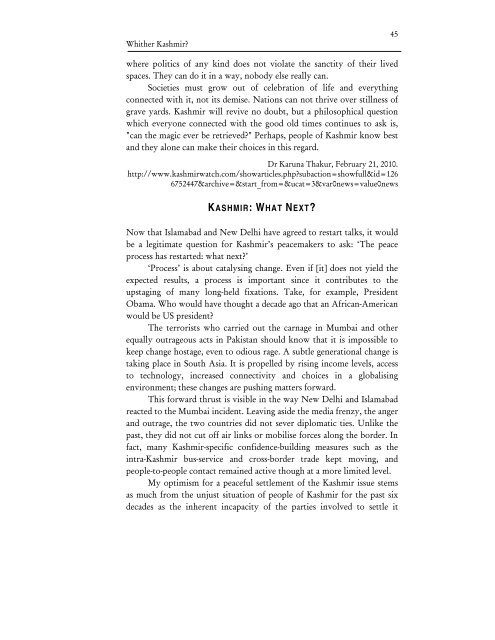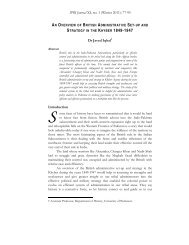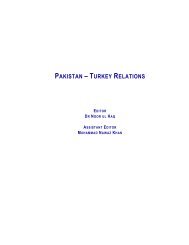120 Whither Kashmir? (Part II) - Islamabad Policy Research Institute
120 Whither Kashmir? (Part II) - Islamabad Policy Research Institute
120 Whither Kashmir? (Part II) - Islamabad Policy Research Institute
Create successful ePaper yourself
Turn your PDF publications into a flip-book with our unique Google optimized e-Paper software.
<strong>Whither</strong> <strong>Kashmir</strong>?<br />
where politics of any kind does not violate the sanctity of their lived<br />
spaces. They can do it in a way, nobody else really can.<br />
Societies must grow out of celebration of life and everything<br />
connected with it, not its demise. Nations can not thrive over stillness of<br />
grave yards. <strong>Kashmir</strong> will revive no doubt, but a philosophical question<br />
which everyone connected with the good old times continues to ask is,<br />
"can the magic ever be retrieved?" Perhaps, people of <strong>Kashmir</strong> know best<br />
and they alone can make their choices in this regard.<br />
Dr Karuna Thakur, February 21, 2010.<br />
http://www.kashmirwatch.com/showarticles.php?subaction=showfull&id=126<br />
6752447&archive=&start_from=&ucat=3&var0news=value0news<br />
KASHMIR: WHAT NEXT?<br />
Now that <strong>Islamabad</strong> and New Delhi have agreed to restart talks, it would<br />
be a legitimate question for <strong>Kashmir</strong>’s peacemakers to ask: ‘The peace<br />
process has restarted: what next?’<br />
‘Process’ is about catalysing change. Even if [it] does not yield the<br />
expected results, a process is important since it contributes to the<br />
upstaging of many long-held fixations. Take, for example, President<br />
Obama. Who would have thought a decade ago that an African-American<br />
would be US president?<br />
The terrorists who carried out the carnage in Mumbai and other<br />
equally outrageous acts in Pakistan should know that it is impossible to<br />
keep change hostage, even to odious rage. A subtle generational change is<br />
taking place in South Asia. It is propelled by rising income levels, access<br />
to technology, increased connectivity and choices in a globalising<br />
environment; these changes are pushing matters forward.<br />
This forward thrust is visible in the way New Delhi and <strong>Islamabad</strong><br />
reacted to the Mumbai incident. Leaving aside the media frenzy, the anger<br />
and outrage, the two countries did not sever diplomatic ties. Unlike the<br />
past, they did not cut off air links or mobilise forces along the border. In<br />
fact, many <strong>Kashmir</strong>-specific confidence-building measures such as the<br />
intra-<strong>Kashmir</strong> bus-service and cross-border trade kept moving, and<br />
people-to-people contact remained active though at a more limited level.<br />
My optimism for a peaceful settlement of the <strong>Kashmir</strong> issue stems<br />
as much from the unjust situation of people of <strong>Kashmir</strong> for the past six<br />
decades as the inherent incapacity of the parties involved to settle it<br />
45




